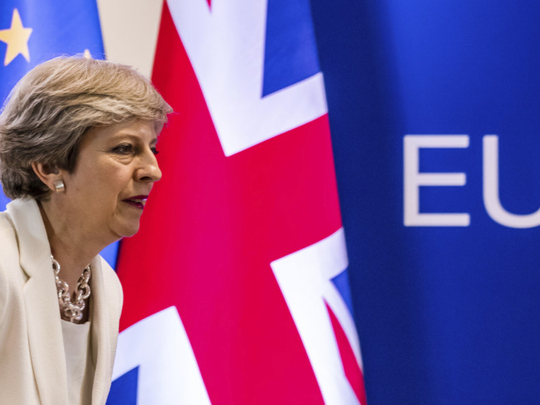
As the government of the United Kingdom navigates the complexity of taking Britain out of the European Union (EU) after 44 years, the harsh reality of the two-year timetable for exit — which shrinks to 18 months if you allow time for ratifying any deal — appears to be dawning. No wonder many politicians are settling on the idea that Britain needs a transitional arrangement beyond March 2019. This would certainly be preferable to a cliff-edge scenario. But as a matter of principle and practicality, it will simply be impossible to negotiate. What Britain should be aiming for instead is an extension of the withdrawal period.
The difficulty arises because it would be almost impossible to negotiate a transitional arrangement without knowing or having agreed what we want our long-term relationship with the EU to look like. This is also the basic question that the EU would rightly ask: What are we seeking to transition to? But negotiations on the shape of this new relationship are unlikely to start until late September at the earliest, after the German elections. And that’s assuming Britain manages to agree first on the Brexit divorce bill, the Irish border and the rights of EU citizens living in Britain and British citizens living in the EU. These are all hugely contentious issues. For instance, on reciprocal rights for citizens, we are a long way from agreement on who should be given these protections, who should enforce them and how expansive these rights should be.
So how will it be possible to have a deal agreed and voted on by the 27 member states in just one year? Leaving is, in effect, a reversal of the accession process, which was long and complex.
Many politicians are talking about the UK transitioning to the European Economic Area (EEA) or the European Free Trade Association (EFTA). The EFTA option would require the agreement of the 27 as well as the EFTA states. But there appears to be resistance to this option: For instance Norway, which in effect runs this club, is not keen on the idea of the UK — a much bigger economy — walking in to upset the apple cart for two or three years, reaping the benefits then leaving. Even if we secured agreement from all countries, being part of the EEA requires accepting the four freedoms — the free movement of goods, services, people and capital — throughout the EEA and EU. Then there is the money. We would be paying into the EU, albeit less than we pay as a full member, but would not be at the table: pay with no say. This is a considerably weaker position than we are in at present. And what would happen to Britain’s members of European Parliament? An extension would allow UK to start on all the huge tasks that need to be completed before we leave.
In view of these challenges, the most logical and practical approach would be to seek an extension of the withdrawal period. This would allow time for meticulous planning to limit the damage of Brexit. It would allow us to start on all the huge tasks that need to be completed before we leave, including establishing new institutions — which would have to be staffed and trained to implement the necessary new UK laws — while adapting other institutions, such as the Border Agency and HM Revenue & Customs, as well as setting up control mechanisms for medicines, chemicals, aviation, nuclear imports and food regulation. New fisheries agreements must be put in place for shared stock management in North Sea and Atlantic waters, new border arrangements between Northern Ireland and Ireland worked out, World Trade Organisation tariff schedules and quotas must be negotiated with 163 countries and new trade measures must replace EU measures protecting UK industry against dumped imports, without which the steel industry in South Wales, for instance, could be wiped out immediately after Brexit. Not to mention the tens of thousands of laws that would have to be repatriated. Quite a to-do list.
The request for more time should be made as soon as possible. The 27 other members would have to approve an extension, but they would be more inclined to agree as it is in everyone’s interests. In any case, the longer the uncertainty over a looming cliff-edge persists, the more UK-based businesses will have to plan to move parts of their operations to mainland Europe. The governor of the Bank of England, Mark Carney, has noted that uncertainties about the eventual relationship are weighing on businesses. “We all need some level of certainty and confidence that the politicians are not making things up as they go along,” he said.
As Lord Mountbatten said when the separation of India and Pakistan was being negotiated: “I fear there will be no victors here.” History gives us too many examples of people perishing when weak leaders posture and rush to enhance their own power base under the guise of implementing the will of the people.
— Guardian News & Media Ltd
Gina Miller was the lead claimant in the successful legal fight to allow parliament to vote on triggering Article 50.









